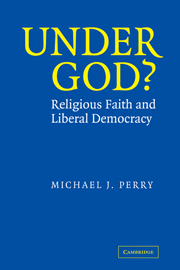Book contents
- Frontmatter
- Contents
- Introduction: The Controversy over Religion in Politics
- I Mainly for the Agnostics and the Exclusionists
- 1 What Does the Establishment Clause Forbid? Reflections on the Constitutionality of School Vouchers
- 2 Why Political Reliance on Religiously Grounded Morality Does Not Violate the Establishment Clause
- 3 Why Political Reliance on Religiously Grounded Morality Is Not Illegitimate in a Liberal Democracy
- II Mainly for the Agnostics and the Inclusionists, Especially Inclusionists Who Are Religious Believers
- Conclusion: “This Nation, Under God”
- Notes
- Index
2 - Why Political Reliance on Religiously Grounded Morality Does Not Violate the Establishment Clause
Published online by Cambridge University Press: 05 June 2012
- Frontmatter
- Contents
- Introduction: The Controversy over Religion in Politics
- I Mainly for the Agnostics and the Exclusionists
- 1 What Does the Establishment Clause Forbid? Reflections on the Constitutionality of School Vouchers
- 2 Why Political Reliance on Religiously Grounded Morality Does Not Violate the Establishment Clause
- 3 Why Political Reliance on Religiously Grounded Morality Is Not Illegitimate in a Liberal Democracy
- II Mainly for the Agnostics and the Inclusionists, Especially Inclusionists Who Are Religious Believers
- Conclusion: “This Nation, Under God”
- Notes
- Index
Summary
I say, sir, that the purity of the Christian church, the purity of our holy religion, and the preservation of our free institutions, require that Church and State shall be separated; that the preacher on the Sabbath day shall find his text in the Bible; shall preach “Jesus Christ and him crucified,” shall preach from the Holy Scriptures, and not attempt to control the political organizations and political parties of the day.
Senator Stephen A. DouglasPRELIMINARIES
In this chapter, as in the preceding one, I address a question about the meaning of the constitutional imperative that government not “establish” religion. The question I address in this chapter is: Do legislators or other policymakers violate the nonestablishment norm by outlawing particular conduct, or otherwise disfavoring it, on the basis of a religiously grounded belief that the conduct is immoral – a religiously grounded belief, for example, that same-sex unions are immoral? (Government can disfavor conduct without banning it. For example, for a legislature to decline to extend to homosexual unions any of the benefits it grants to heterosexual marriages is not for the legislature to outlaw same-sex unions, but it is for the legislature to disfavor them.) This question is relevant to citizens of the United States, because the nonestablishment norm is an important part of the fundamental law – the constitutional law – of the United States.
- Type
- Chapter
- Information
- Under God?Religious Faith and Liberal Democracy, pp. 20 - 34Publisher: Cambridge University PressPrint publication year: 2003



